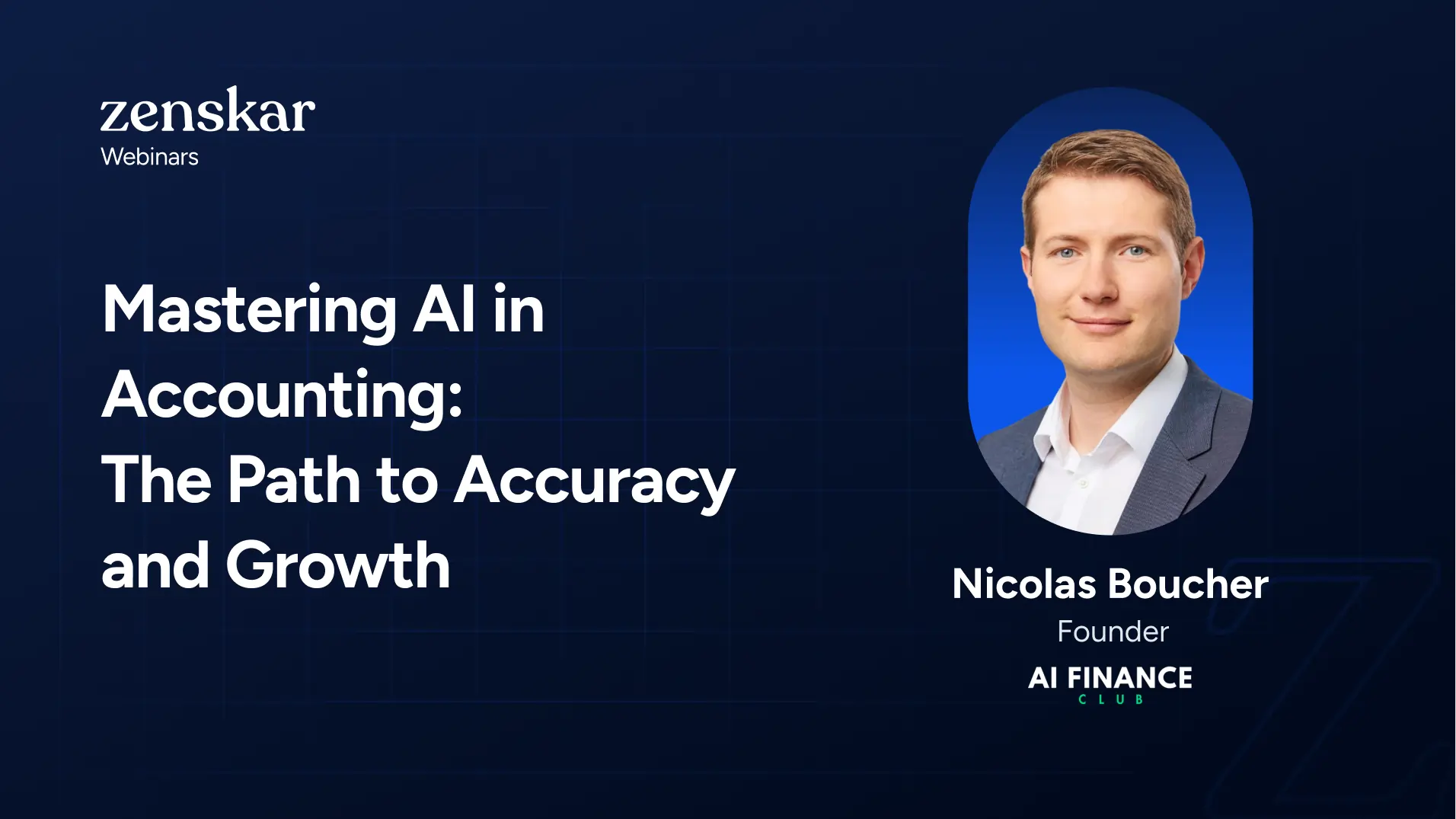Today’s finance leaders are rewriting the playbook, moving from back-office operators to strategic copilots. In this masterclass, we explore how CFOs are embedding AI into finance to unlock speed, accuracy, and control without trading off flexibility.
Join Kevin Appleby, host of GrowCFO, and Apurv Bansal, Co-founder & CFO at Zenskar, as they discuss real-world AI applications, automation frameworks, and how to build a future-ready finance org.
You’ll learn
- From Manual to Intelligent Finance: Automating reconciliation, provisioning & reporting
- AI in Action: How AI flags anomalies before they impact revenue
- Revenue Optimization Without Leakage: Strategies to spot inefficiencies early
- Next-Level Business Partnering: Empowering finance to support GTM teams
- Your 2025 Finance Stack: Building a lean, scalable & AI-powered operation
Who should watch?
CFOs, VPs of Finance, FP&A Leads, Controllers, and Finance Transformation champions who are building agile, tech-forward teams.
Meet your speakers
Kevin Appleby
Host, GrowCFO
Kevin is one of the UK’s leading voices in CFO transformation, with deep experience helping finance leaders adapt to the changing demands of modern business. Through GrowCFO, he’s built a global community of thousands of senior finance professionals, providing guidance on leadership, strategy, and digital evolution.
Apurv Bansal
CEO & CFO, Zenskar
Apurv blends deep finance expertise with a builder’s mindset. At Zenskar, he’s leading the charge in automating billing and empowering modern finance teams with smarter workflows. His focus? Turning complexity into clarity for high-growth companies.
Webinar Summary
1. How has the CFO role evolved since 2020?
During the COVID-19 crisis, Chief Financial Officers were forced to lead from the front. Many had to quickly redesign cash flow models and implement furlough cash flow strategies. This was the first time several Chief Financial Officers became deeply involved in business strategy and operations. That expectation has stayed. Today, when I attend CFO exchanges, I notice that the Chief Financial Officer is seen as a core advisor, not just a compliance officer. The most important shift is that the role is now expected to deliver real-time insights, not just monthly reporting.
2. What are CEOs expecting from finance leaders now?
Chief Executive Officers and Boards expect the Chief Financial Officer to act as a strategic thought partner. At Zenskar, I have worked closely with customers where finance leaders supported marketing in analyzing channel-level ROI, partnered with product teams on pricing and packaging, and co-owned compensation design with sales. None of this is possible without relationships across departments. This is no longer about number crunching—it is about real-time business support.
3. Can you share a case where small automation drove significant impact?
At Bishop Lifting, the Chief Financial Officer deployed AI agents without changing any core system. He kept his existing Enterprise Resource Planning, purchase-to-pay, and sales systems. Instead, he added AI finance tools that reduced Days Sales Outstanding. The agent flagged overdue accounts, prioritized collections, and auto-sent personalized reminder letters. That one move improved working capital without touching the main system. This was not a million-dollar project—it was a targeted fix that delivered financial results.
4. Which KPIs change most with AI-led transformation?
Two clear ones:
- Revenue per finance team Full-Time Equivalent. Our customers scale to $50 million and beyond without doubling the finance team.
- Revenue leakage. One client recovered $700,000 in missed invoices after we scanned their sales contracts with our Contracts AI agent and matched it with their manual invoice history. Underbilling is invisible until it is audited. An automated billing system eliminates that blind spot.
5. What is the biggest blocker to AI adoption?
It is not money—it is data. Most companies have poor-quality data scattered across multiple systems. Without a clean, unified dataset, any Artificial Intelligence agent will give the wrong answer. Data governance and integration come before automation. Many companies are also unsure who owns this transformation. It must be led by the finance team, not the Information Technology department.
6. How should smaller finance teams approach AI?
AI is not for everyone. But if your team is turning down new projects due to bandwidth issues, that is your signal. One of our clients avoided hiring two additional staff in accounts receivable by using our account reconciliation agent. When Artificial Intelligence helps you say “yes” more often—without hiring—that is when it is working for you.
7. What are AI agents in practical terms?
AI agents are software systems that think, decide, and act on your behalf. For example, our Contracts AI reads a sales agreement, understands the pricing and schedule, and auto-generates billing entries. It does the reading, applies logic, and then performs the action—just like a team member would. But it never sleeps or misreads a term.
8. What is an example of using an AI agent in daily workflows?
Let us say you want to issue a credit note. Traditionally, you would click through your billing software, fill out a form, and send the document. Now, you type “Issue a $500 credit for Acme Inc. due to a billing error” into our chat interface, and the agent completes the task instantly. Multiply this across 100 such actions, and you save days of work.
9. How can finance leaders avoid shiny object syndrome?
Start with one specific pain point, measure its return on investment, and only then expand. Many Chief Financial Officers got real value from implementing basic invoice scanning tools like Receipt Bank. The same applies to AI agents—start where the benefit is obvious. Avoid rolling out ten tools at once. One win is better than ten half-finished pilots.
10. How long should AI agent implementation take?
If a vendor says “six months,” that is not Artificial Intelligence-native. With Zenskar, most AI agents go live in two to three weeks. Ask vendors: “How much of the setup will you do? How much engineering support do we need to provide?” If they need months of configuration or dozens of calls, it is not a modern solution.
11. What are the essential components of a 2025 finance tech stack?
It depends on your business. But generally:
- Choose tools with fast deployment.
- Prioritize modular platforms for order-to-cash system and purchase-to-pay.
- Look for Artificial Intelligence-powered analytics for Financial Planning and Analysis.
- Ensure systems speak to each other—either through Application Programming Interfaces or native integrations.
You do not need everything today. Start where your gaps are widest.
12. What is a red flag when evaluating AI vendors?
If they say “Artificial Intelligence-powered” but cannot explain how their agent decides or acts, that is a red flag. Ask for metrics: “How many hours does this agent save per Full-Time Equivalent?” “What was the revenue recovery before and after?” A vague answer means it is still a work in progress.
13. What mindset shifts must finance leaders embrace?
You need to lead the change, not support it. That means: involve your team from design to implementation. Make the change feel like something they are part of—not something done to them. People do not fear Artificial Intelligence—they fear being left behind. Show them how it lets them do more interesting work, not less work.
14. Can AI agents work with legacy Enterprise Resource Planning systems?
Yes. Most AI agents connect via standard Application Programming Interfaces or file uploads. You do not need to replace Oracle or Netsuite. We have clients who use our agents to optimize billing logic or detect missed invoices even while continuing with their existing core systems.
15. What is the most common mistake in finance transformation?
Trying to replace everything at once. Instead, identify where your manual processes hurt the most—like collections, reconciliations, or contract billing—and fix those with AI agents. Once you see measurable returns, expand. Transformation should be modular, not monolithic.


















